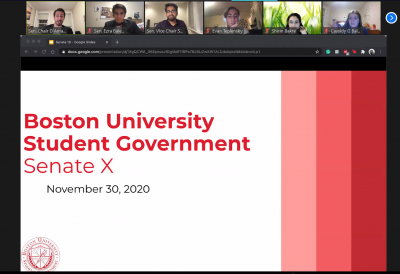
Boston University Student Government discussed surveying students on their opinion of StuGov, this semester’s budget expenses and the upcoming StuGov election cycle, in a meeting streamed live on Youtube Monday night.
The Expect More Committee, led by Maya Williams, a junior in the College of Arts and Sciences, briefed StuGov on the results of a 76-person student survey she conducted regarding StuGov’s role on campus.
Fifty percent of respondents said they were neither pleased nor displeased with StuGov, according to the survey. Williams said some respondents reported they were unaware of StuGov events and want more outreach.
“People would like to see more of Student Government in general,” Williams said. “They would like more involvement or engagement of the student body.”
Williams said she plans to conduct additional surveys, which will include specific questions about students’ suggestions regarding StuGov, after Sen. Juncheng Quan raised concerns about student input.
The meeting continued with budget updates from Vice President of Finance Megan de Armas, a junior in the Questrom School of Business.
Funds used for this year decreased due to the pandemic, de Armas said. The lump sum of money StuGov received this semester from the Student Activities Office amounted to $18,159, and it has used $6,513 of these funds.
StuGov spent this money on expenses such as a website license, a partnership with speaker Monet Roberts, StuGov merchandise and a retreat.
De Armas said she referenced past budgets and used input from Cabinet members and other StuGov officials to determine money distribution.
Within the Cabinet, City Affairs and Social Advocacy were given the most money — $4,780 and $1,038, respectively.
The most significant change to the budget was within 16,000 Strong, a sexual assault awareness organization. Last year, it received $1,200, and this semester it received $428.
After budget updates, the meeting moved to a presentation by the Student Elections Commission and the Senate Election Oversight Committee, which have been preparing for StuGov elections, which take place in March.
Students can express intent to run as early as Dec. 7 via a Google Form, and can start campaigning March 1.
The limitations of the pandemic added new regulations to the campaigning process, including a ban on soliciting and in-person campaigning — outside of commission supervision.
EOC Co-Chair Daniel Daponte said these rules were put in place to ensure all students, whether remote or in-person, have the same opportunities to interact with candidates.
“We don’t want someone, a slate or a party on campus, having an unfair advantage over remote students,” CAS junior Daponte said.
The SEC and EOC will host outdoor meet-and-greets for candidates March 3, 4, 7 and 8, with virtual town halls on March 15 and 16.
Juncheng Quan is a news writer for The Daily Free Press. He was not involved in the reporting of this article.






















































































































